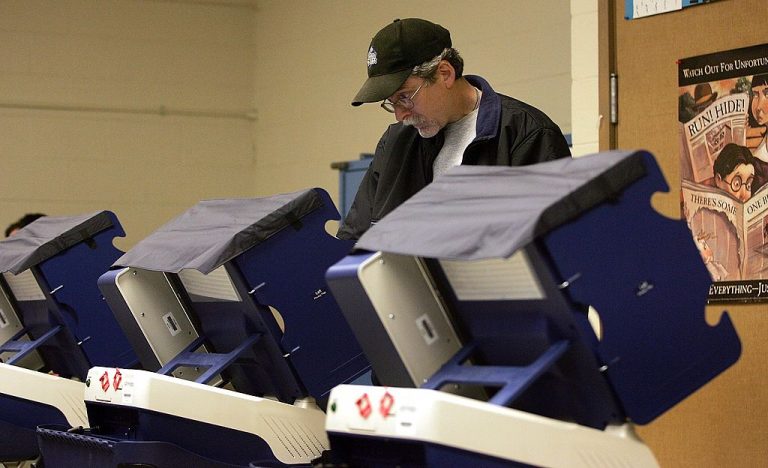On Jan. 31, a federal judge tarried on releasing a confidential report analyzing the integrity of Georgia’s voting machines amidst a lawsuit against a flip-flopping state official.
Both Georgia election officials and plaintiffs in a lawsuit against Secretary of State Brad Raffensperger’s office that seeks to replace Georgia’s voting systems asked U.S. District Judge Amy Totenberg to release a classified report analyzing the integrity of the state’s Dominion Voting Systems election equipment.
The report possibly outlines how hackers could attempt to revise the outcome of an election. It focused particularly on the type of electronic ballot marking devices used in several key battleground states, including Georgia, during the 2020 Presidential Election, of which many claim voting irregularities transpired.
The lawsuit was filed by elections transparency watchdog True the Vote, which said in a Jan. 5 statement that following “a year’s worth of research and analysis,” it “submitted three official complaints to the Georgia Secretary of State’s office regarding occurrences in the 2020 General and 2021 Run-off Elections.”
The Halderman Report
During a Jan. 27 teleconference, Totenberg announced that she would decide whether to release a redacted version of the study on Jan. 31.
Success
You are now signed up for our newsletter
Success
Check your email to complete sign up
However, on Monday Totenberg stated before deciding whether to make portions of the report public that she wanted to consult several parties involved and asked for suggestions from both Georgia election officials and plaintiffs, to submit their proposals by Feb. 2.
The study, executed by Alex Halderman, a computer science professor at the University of Michigan, provides sensitive information on the ability to cheat ballot marking devices.
“I want people to understand the general concerns…without giving anyone a road map to hacking or intruding on the system or manipulating it,” Totenberg said during the court hearing.
READ MORE:
- Georgia Secretary of State Accepted $5 Million from Zuckerberg-backed Group
- Georgia to Remove Over 100,000 Obsolete Voter Files From State Voter Rolls
- Georgia Election Board Hands Over 35 Voter Fraud Cases to Prosecutors
Another option discussed in court would be releasing the report to the Cybersecurity and Infrastructure Security Agency, a part of the U.S. Department of Homeland Security.
The agency responded in a letter to the judge on Jan. 21, informing her that potential weaknesses could be disclosed and mitigated, but warned against making such vulnerabilities public under the pretext that it would be “critical to the security of our Nation’s information systems.”
The vulnerability was first noted by Halderman, who in his role as an expert for plaintiffs in the election security lawsuit, was granted full access to Georgia’s voting equipment for 12 weeks. Halderman, in turn, delivered a 25,000-word report in sealed court documents in July.
Halderman, who also outlined risks for upcoming elections this year, pinpointed that Georgia’s voting system prints out paper ballots that generate QR-codes illegible for confirmation by human beings, making them much more sensitive to cheating than traditional paper ballots, which are filled out by hand.
A flip-flop
Raffensperger, a Republican, said in a statement on Jan. 26 that the report should be declassified because of rumors as to their contents “generating misleading media articles about the Dominion voting equipment used in Georgia.”
“The smoke and mirrors techniques of Professor Halderman and the plaintiffs, in this case, does not serve Georgia voters well,” Raffensperger said.
Though the Georgia secretary of state’s office is a defendant in the case, it hadn’t seen or asked to see any details of Halderman’s report, not even the redacted version. Only attorneys and expert witnesses had insight into the files.
“The public deserves to know the context of J. Alex Halderman’s claims and his testimony regarding the 2020 election,” Raffensperger said, in an apparent 180 on his office’s prior position.
“We are taking on these claims in court, and we will win,” he said bravely, declaring the state’s election systems “are safe and secure.”
Raffensperger’s U-turn was likely inspired by Georgia Governor Brian Kemp, who also weighed in on the discussion.
Kemp, a Republican who seeks re-election in November this year, said by means of his spokeswoman Katie Byrd earlier that day that Raffensperger, “Should immediately gather all relevant information regarding this report, thoroughly vet its findings, and assure Georgians he is doing everything possible to ensure the system, procedures and equipment are completely secure.”
“Now that Gov. Kemp publicly called him out for failing to comply with his duties to address those vulnerabilities and ignoring the report since last summer, he’s desperate to point the finger at others,” David Cross, an attorney for the plaintiffs, said, according to the Atlanta Journal-Constitution.
“But he made the decision many months ago not to address the report, and he’s accountable to voters for that deliberate dereliction,” Cross added.
















